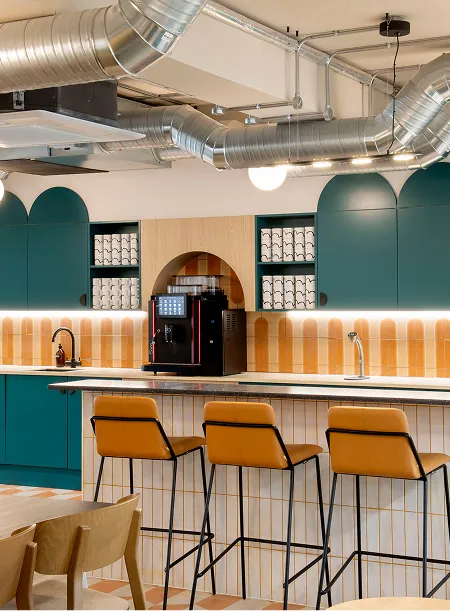5 Benefits of Flexible Working for Employers

Since the coronavirus pandemic, flexible working has become an increasingly hot topic. It's an arrangement that many employees are asking for as businesses return to the office to long commutes and poor work-life balance.
Yet, three out of four jobs advertised in the UK still do not offer flexible working options.
Some of the reason for that is employers' and managers' ongoing scepticism about flexible working. However, there are many compelling reasons that flexible working can be better for your business.
Let's take a look at the benefits of workplace flexibility for employers.
What does flexible working really mean?
You probably already know this, but in case there’s a part of it you haven’t come across, we’ve broken it down.
Flexible working gives employees more control over when, where and how they do their work. It has many benefits including empowering employees, improving work-life balance, boosting engagement and productivity, and improving retention and recruitment.
In practice, this might mean a hybrid working arrangement where your workforce is free to work from home a few days a week and in the office for the others.
It might mean compressed work weeks where your employees work the same number of hours in four days instead of five, or it might mean giving employees the choice to work different hours to the traditional nine-to-five, based on their individual needs. It can even mean part-time job shares.
As an employer, it's up to you to set the parameters of flexible working for your employees. Hybrid, part-time, compressed or a mix of them all — creating a flexible workspace for your employees is up to you.
1. Boosts engagement
One of the key benefits of flexible working is that it can improve your employees' engagement. By offering flexible arrangements, you show that you care about your employees and this increases their loyalty.
For example, one American survey found that 36% of respondents believed that creating arrangements for flexible working was the most important thing their employer had done to support their mental health. The same survey found that flexible work was considered more important than career progression, demonstrating the high value that employees place on flexibility.
Employees are far more likely to go above and beyond in their jobs if they know that their employer has their back. Moreover, flexible workplace policies reduce absenteeism, meaning that you're less likely to find your employees missing shifts or disappearing for hours when they're most needed. With flexible schedules, you can make arrangements with employees to give them the freedom they need and therefore reduce unplanned absences.
2. Enhances productivity
Following on from the previous point, engaged employees are more productive employees. They're less likely to take sick days and more likely to get lots of work done.
One of the benefits of workplace flexibility is that employees don't have to do potentially long or stressful commutes as frequently. Stressful commutes leave your employees unhappy and unproductive by the time they get to work and in the long term they can contribute to anxiety, depression and feelings of dread.
Flexible working schedules also allow employees to pick their hours to suit their personal needs and routines, allowing them to more easily drop off their kids at school or end work earlier some evenings to fit in a hobby or fitness class.
As well as being good for employees' happiness, this means that they’re more likely to be relaxed and refreshed during work hours — resulting in higher levels of productivity and performance.
Ultimately, a flexible work schedule means that employees can do their work at the times when they are most productive. This means that your staff can do their best work, regardless of whether they're early birds or night owls.
Plus, with employees working staggered hours, it's more likely that someone will be online outside traditional work hours to deal with customer enquiries — boosting your customer service capabilities.
3. Improves employee retention
Another advantage of introducing flexible working is that it’ll make your employees less likely to quit their jobs. Flexibility is one of the top priorities for workers: one survey of British workers found that 58% considered flexibility more important than career progression.
And flexible work schedules are already having a noticeable impact on employee turnover. 76% of senior business decision makers say that flexible work policies have positively impacted employee retention in the last two years, according to one poll.
This means that if you're serious about staff retention, flexible work policies are more important than ever.
4. Attracts top talent and increases diversity
Employers who offer flexible working have seen a 20% improvement in recruitment and retention compared to two years ago. Moreover, 70% of senior decision makers in businesses reported that flexible work arrangements had a positive impact on recruitment.
In one survey, 71% of people listed workplace flexibility as a top priority when choosing a job. This survey also found that more women than men prioritised workplace flexibility, likely reflecting the caring duties that many women complete and have to fit around their working hours.
Providing flexible work policies for your employees can make an organisation stand out when it comes to recruiting new talent. This means that if you create a successful flexible workplace, you're more likely to attract talent from a wider and more diverse talent pool. Boosting diversity has been found to correlate with better business performance.
5. Reduces costs
Flexible working can save employers money in a few ways. Firstly, if your staff are only in the office a few days a week, you can reduce the costs of heating the office when nobody's there. Even if this is only one day a week, this can lead to significant cost savings over the course of the year.
Secondly, with a flexible workforce, you might even find that you are able to downsize your office to somewhere with a cheaper lease or even move to a coworking space for further flexibility.
Thirdly, flexible working can save you money on employees' expenses. If you usually have to pay for some of your employees' travel expenses, flexible working with less travel can bring down costs.
Finally, office-supply-related costs such as printing, coffee and more are reduced when people work from home more often. These may seem small but for startups and small businesses these cost savings can make a real difference.
The flexible joy of coworking
There's a reason that so many people are now moving to coworking spaces: they're a great way to provide flexibility at work.
Coworking spaces like us are a great solution if you're looking for an easy, casual office space that reflects your flexible hours and working patterns.
We offer dedicated desk memberships, private offices and office shares so there's something for every small business or startup's needs. From social events and Cake Wednesdays to dogs on deman and Friday drinks trolley, we offer amazing perks that will make your employees excited to come to the office:
Sound good? We know it does!
Got Questions? We've Got Answers
We've put together some FAQs to help you settle into life at Runway East.
find your
perfect space
Discover flexible workspace solutions across London, Bristol, Bath, Brighton, and Birmingham. From private offices to enterprise suites, find a space that grows with your team and keeps them happy every day.
.webp)


.jpg)
.png)
.avif)